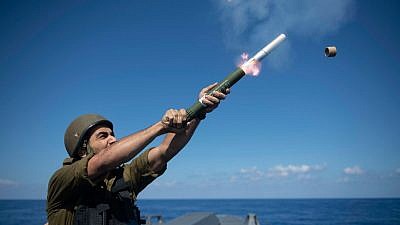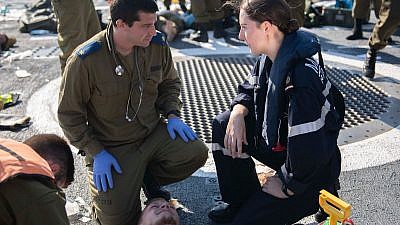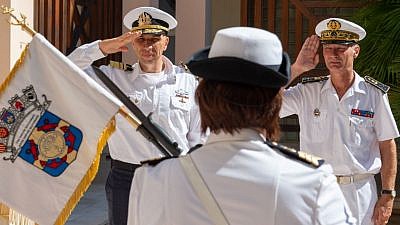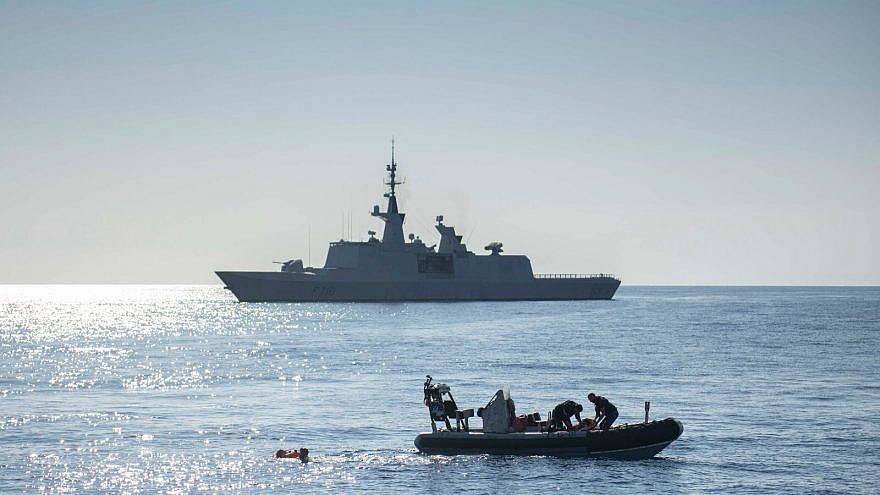In a sign of growing Mediterranean cooperation, two Israel Navy missile ships paid a visit to France earlier this month, where they held extensive drills with the French Navy, the first such event to occur in 59 years.
Staff Sgt. Adrien Assayah, an Israel Navy Non-Commissioned Officer (NCO) who immigrated to Israel from Lyon, France, at the age of 15, told JNS that taking part in the exercise as a French-Israeli officer was a moving experience.
The French military is a volunteer professional force, while the Israel Defense Forces is primarily made up of mandatory conscripts, accounting for a significant difference in age.
Despite the age gap, said Assayah, the French ship commander remarked “how highly professional and well-trained we are, and noted our ability to deal with any situation. The drill was a very positive event.”

The ships conducted joint combat, search and rescue, and medical-treatment exercises, marking the first time that this happened in French waters since 1959. In recent years, the French Navy has visited Israeli naval bases for joint exercises on multiple occasions.
“There was some excitement on our side, as we are not so used to sailing such distances. And the French were excited because they had not received Israeli crews” for nearly six decades, reported Assayah.
He described the French Navy as being “very professional.”
“This was visible in how they worked, and their ship routine,” he said. “They were also great hosts. Our talks with them were very open. We discussed everything, and we felt very comfortable. The cooperation was incredible.

“I’m a young NCO, but I believe that diplomatic relations between the two countries improve as a result of this kind of naval cooperation. On a personal level, to come to France in an IDF uniform is something I could never have imagined. I was very moved and felt proud,” said Assayah.
‘Each side brings its own knowledge’
Lt. Cmdr. Yael (full name withheld), head of the International Policy and Planning Section in the Israeli Navy, said a “thriving cooperation” has developed with the French Navy over recent years, comparing it to a “good friendship.”
With French Navy ships docking at Israeli bases routinely, due to their activities in the Mediterranean Sea and the growth of joint exercises, the idea arose for a reciprocal visit to France, she said.
During the time of the joint drills, Israeli Navy Commander Maj.-Gen. Eli Sharvit visited France, where he met with senior French naval commanders.
In addition, local Jewish community representatives boarded the Israeli missile ships for a Friday-night meal.

“France is a leading country in the world that has interests in our region. It is important to safeguard this friendship and cooperation with them,” said Yael.
“Each side brings its own knowledge, whether based on operations, systems or the activities that each side conducts. The French Navy is large and operates in our sector, as well as in further sectors, like the the Black Sea or Baltic Sea. An exercise is also a joint language. We know this drill very well. When you do this with another navy, you sharpen your ability to work in a larger coalition,” she stated.
Ultimately, this kind of cooperation between Mediterranean naval forces helps Israel and the IDF face its security challenges, she argued. “These exercises can only assist us operationally, through our drills, and because this is a statement about cooperation, about who stands with us, and behind us.”

























